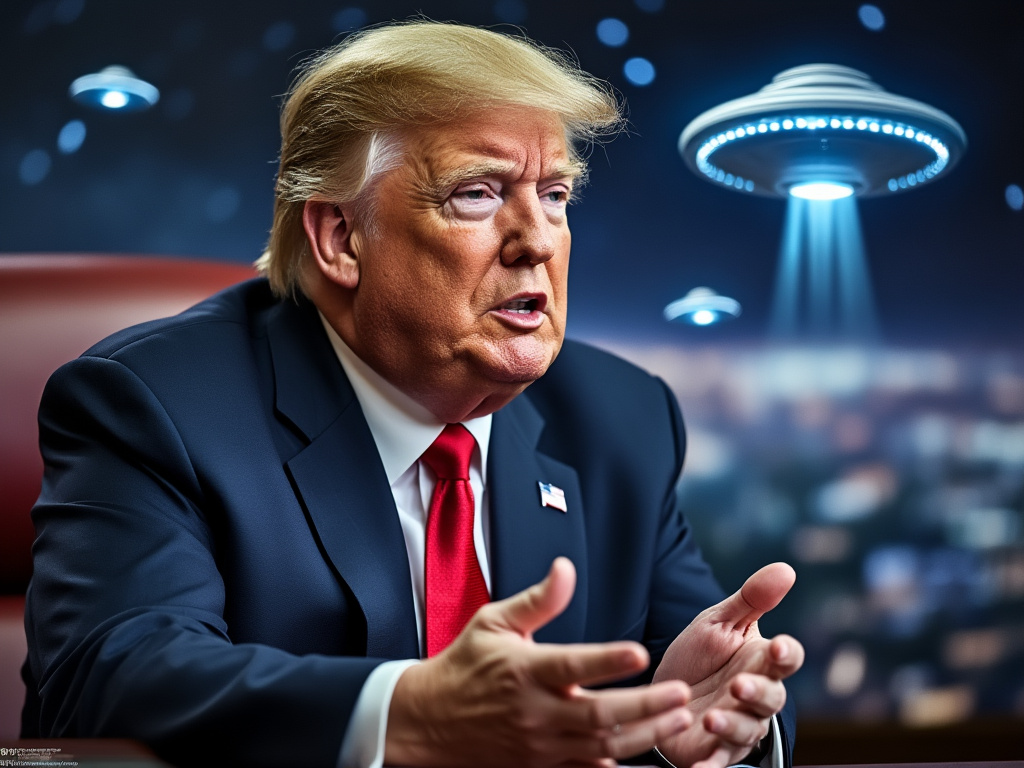President Donald Trump on UFOs

President Donald Trump’s tenure saw an unprecedented openness regarding unidentified flying objects (UFOs) and extraterrestrial phenomena. Through various interviews, we can follow Trump’s comments on UFOs and related issues, revealing insights into his administration’s stance on extraterrestrial matters and national security.
In a Fox News interview posted on July 5, 2019, President Donald Trump discussed his views on UFOs with Tucker Carlson. The conversation, set against the backdrop of the North Korean border, steered away from typical foreign policy topics to the more unusual subject of unidentified flying objects. Carlson noted that the federal government had become increasingly transparent about its decades-long investigations into UFOs, prompting him to ask the President if these objects are real.
Trump responded somewhat cryptically, stating he didn’t want to comment on the matter too deeply. He admitted to doubting the existence of UFOs, despite reports from credible pilots claiming they had witnessed unexplainable phenomena. The President acknowledged the possibility of their existence, reflecting an open-minded stance.
Carlson then referenced a claim from a government official about the U.S. possessing UFO wreckage stored at an Air Force base. Trump indicated he was unaware of such evidence, having only encountered the idea through media like Carlson’s show.
Following the President’s remarks, Carlson brought on Nick Pope, a journalist and former investigator of UFO sightings for the British Ministry of Defense. Pope found Trump’s straightforward response refreshing, contrasting it with the evasive or humorous reactions typically given by officials. He speculated that Trump’s reluctance to discuss the topic might stem from potential exposure to classified information.
In an interview with ABC News on June 15, 2019, President Donald Trump was asked by George Stephanopoulos if he believed he would be informed about any evidence of extraterrestrial life. Trump confidently responded that if such a case existed, “Our great pilots would know.” This statement highlights the President’s trust in the capabilities and observations of U.S. pilots, implying that their expertise and experiences would be key in identifying any potential extraterrestrial activity. Trump’s remark reflects a reliance on the firsthand accounts and professional judgment of military aviators to determine the existence of unexplained aerial phenomena.
In an interview posted by NBC News on June 19, 2020, President Donald Trump addressed the topic of declassifying information about Roswell, the site famously linked to UFO conspiracy theories. When asked if he would reveal the truth about extraterrestrials before leaving office, Trump acknowledged the public’s intense curiosity about the subject. He remarked that the question, though it might sound amusing, was genuine and of great interest to millions of people who are eager to know more about Roswell. While he refrained from disclosing specific details, Trump hinted that he possessed “very interesting” information regarding the site. When pressed about the possibility of declassifying this information, he responded ambiguously, indicating he would have to consider it. His comments left the door open to potential revelations but stopped short of any concrete commitments.
The United States Space Force (USSF) was established by President Donald Trump on December 20, 2019, marking the first new military branch since the Air Force in 1947. Trump’s administration emphasized the need for space security due to increasing militarization by other countries. Trump’s interest in UAPs (Unidentified Aerial Phenomena) was evident through his comments and briefings on the subject, reflecting a broader commitment to national defense and curiosity about extraterrestrial threats. This initiative underlined Trump’s strategy to prioritize American dominance and security in space.
John Ratcliffe, former Director of National Intelligence under President Donald Trump, played a significant role in the administration’s stance on Unidentified Aerial Phenomena (UAP). Ratcliffe, appointed by Trump in 2020, openly discussed the increase in UAP sightings and their implications for national security. He revealed that many incidents involved advanced technology surpassing current human capabilities. His tenure saw the establishment of the UAP Task Force to better understand these phenomena. Ratcliffe’s alignment with Trump extended beyond intelligence matters, as he was also a vocal supporter during the 2020 election challenges.
Haim Eshed, Israel’s former space security chief, claimed that extraterrestrials exist and that President Donald Trump was aware of their presence. Eshed stated that a “Galactic Federation” has been in contact with the U.S. and Israel for years. According to Eshed, Trump was on the verge of revealing this information but was asked not to by the aliens to prevent mass hysteria. This relationship indicates Trump’s involvement in extraterrestrial matters during his presidency.
During his keynote speech at the Scientific Coalition for UAP Studies conference, Ross Coulthart stated that former President Donald Trump is afraid he will be assassinated if he reveals what he knows about UFOs and aliens. Coulthart mentioned, “I know for example Trump’s been briefed… He’s scared they’re going to kill him if he reveals what he knows.” This highlights the potential dangers and high stakes involved in disclosing classified information about extraterrestrial matters.
President Trump’s engagement with the topic of UFOs and extraterrestrial life marked a notable shift in the U.S. government’s approach to these phenomena. His administration’s efforts, including the establishment of the UAP Task Force and the founding of the United States Space Force, underscore a commitment to understanding and addressing potential extraterrestrial threats.

